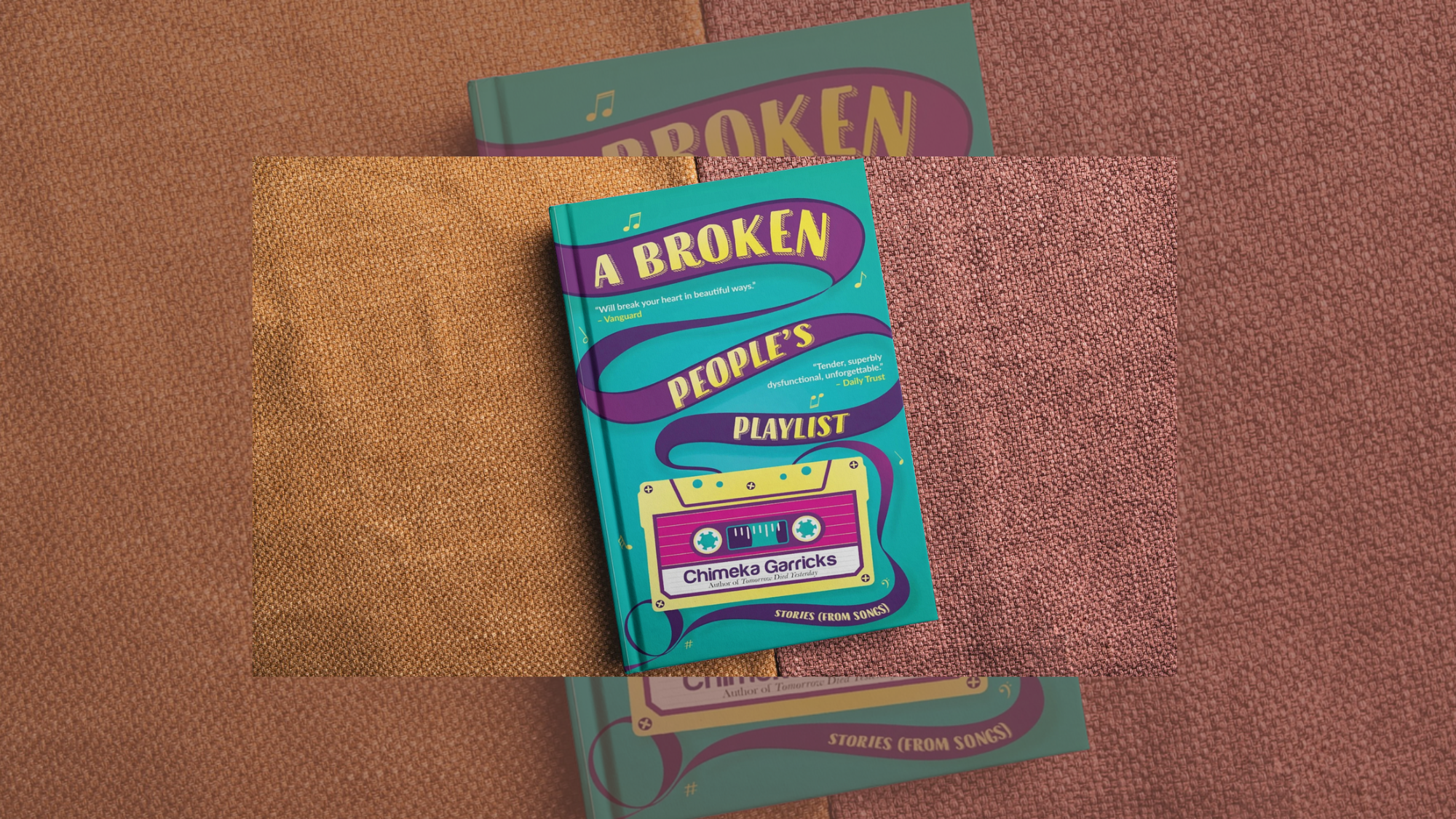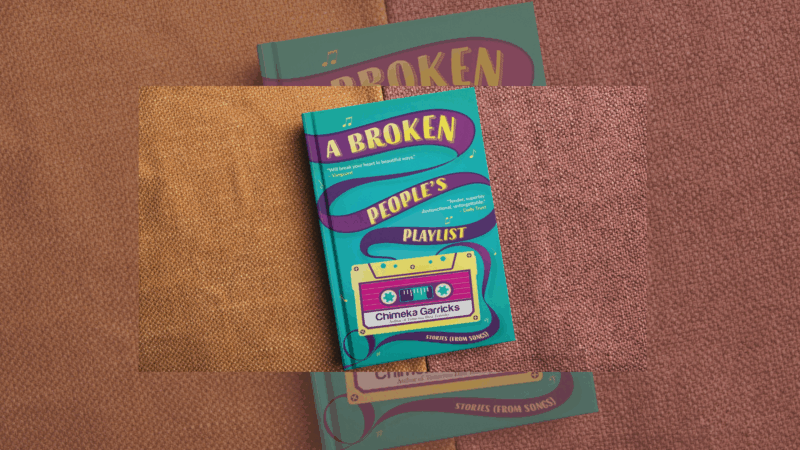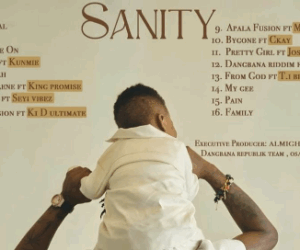
In A Broken People’s Playlist, Chimeka Garricks does something relatable; he holds up a mirror to everyday Nigerians, showing us the beauty, pain, and contradictions that soundtrack our lives. Inspired by twelve songs, each story is a playlist of heartbreak, humour, memory, and regret.
It’s fiction that feels like déjà vu. Every track is familiar, not because we’ve lived it exactly, but because we’ve all, in some way, been broken too.
The first time I opened it, I didn’t expect the ache to be this sharp. Garricks didn’t just write stories; he composed emotional symphonies. His words move like music, tender one minute, ferocious the next. And just like a good song, they leave echoes long after the last note fades.
A Playlist of Pain and Humanity
From “Lost Stars” to “You Suppose Know”, the twelve stories in A Broken People’s Playlist form a meditation on what it means to love, lose, and live in a country that bruises its people daily. Garricks writes with a Nigerian voice, raw, rhythmic, and real.
His prose moves between English and the cadences of Port Harcourt street talk, between the deeply personal and the painfully political.
The book opens with “Lost Stars”, a love story that’s not just about romance but about timing, pride, and the tragedy of what-ifs. Sira and Kaodini’s story unspools like a slow song you can’t skip. They’ve known each other since childhood, loved each other quietly across the years, but life, ambition, geography, and timing get in the way.
When Kaodini finally decides to move from Port Harcourt to Lagos to be with Sira, fate intervenes with brutal finality. His death isn’t just his; it’s the death of every unfinished dream, every “we’ll make it work” that life never lets us keep. Garricks gives us grief that feels so intimate you can taste it; he lets love hurt in the way only real love does.
Then there’s “Music”, where Garricks introduces us to a DJ whose life mirrors the chaos of the sounds he spins. Beneath the beats lies a story of broken families, absent fathers, and the impossible task of loving people who never learned how to love themselves. Garricks paints domestic dysfunction not with melodrama, but with quiet, human truth, like watching your neighbour’s windows at night and realising their chaos looks just like yours.
In “Hurt”, he flips the tone to something darker. Here, we meet Dami, a man both charming and cruel, dying of cancer but desperate to choreograph his own farewell. Dami’s “living funeral” is equal parts absurd and devastating, a performance staged by a man who has hurt too many people to die quietly. But Garricks doesn’t let us off easy.
He makes us sit with Dami’s contradictions, the abuser and the victim, the brother who inspired laughter and caused tears. It’s a haunting reminder that people are rarely just one thing.
READ ALSO: 10 Books Everyone’s Talking About on #BookTok Right Now
The Familiar Sound of a Nation’s Bruise
Garricks doesn’t isolate pain within individuals; he lets the city bleed through them. Port Harcourt isn’t just a setting, it’s a character. Its soot-stained air, its weary streets, its pulse of survival, all play backup vocals to the heartbreaks of its people.
In one story, a young man named Godson becomes collateral damage in a corrupt police operation. Wrong place, wrong time, wrong face. The casual cruelty of his fate feels horrifying precisely because it’s so believable.
We meet Corporal Enenche, a policeman counting down to his retirement, trying to survive the moral grime of the force. We watch him participate in an extrajudicial killing, not out of malice, but habit. Garricks’ brilliance lies in how he writes these moments without moral grandstanding. He doesn’t point fingers; he simply holds up a mirror, and the reflection is damning enough.
In “In the City”, he trades sentiment for suspense. It’s a crime thriller threaded with puzzles and peril, showing how desperation turns good people into survivors and survivors into sinners.
Love, Lust, and the Linger of Memory
If there’s one constant in A Broken People’s Playlist, it’s Garricks’ understanding that love doesn’t always save; it sometimes destroys. In “I Put a Spell on You” and “I’d Die Without You”, love becomes both an addiction and a curse. The stories interlink through recurring characters like Dr. Tonse, whose appearances serve as emotional bridges, reminding us that pain doesn’t end with a story; it ripples into others.
Love, in Garricks’ world, is never pure. It’s laced with guilt, nostalgia, and self-sabotage. In “Love’s Divine” and “Hurt”, we see how affection and abuse can share the same bed, how people mistake obsession for destiny. Yet, through all the ruin, Garricks writes love with tenderness. His characters are flawed, but their longing is sincere.
In “Beautiful War” and “River”, the prose slows down, the rhythm softens, and the emotional notes deepen. He writes about men and women trying to rebuild from loss, trying to find something in the rubble. These are songs of survival, the kind that don’t top charts but stay in your head forever.
READ ALSO: What “Only Big Bum Bum Matters Tomorrow” Says About The Battle for Approval
Flawed Characters, Real People
Every story in this collection feels like an encounter with someone you know. The adulterous husband. The grieving lover. The tired cop. The woman who still prays for a man who broke her heart.
Dami, the charming monster. Prof, the brilliant but morally adrift father. Sira, the woman who chooses logic over love and loses both.
They are not admirable, but they are unforgettable. The characters in this book don’t seek redemption; they seek understanding. They don’t find happy endings; they find survival.
What ties them together is the music, the playlists of their lives. Each story is inspired by a song, but Garricks doesn’t simply borrow the titles; he borrows their emotional DNA. The rhythm of Johnny Cash’s “Hurt” bleeds into the story’s despair.
The yearning in Seal’s “Love’s Divine” echoes through broken relationships. Bez’s “You Suppose Know” becomes a colloquial confession, a reminder that every heartbreak carries its own chorus of guilt and hope.
Chimeka Garricks’ A Broken People’s Playlist asks us to sit with pain, to see ourselves in people we might otherwise judge. Every story is a window into the flawed, fragile, and often foolish parts of being human.
There are no easy resolutions, no moral preaching, just a quiet insistence that life, like music, goes on, sometimes off-key, sometimes out of tune, but always, somehow, worth hearing again.








